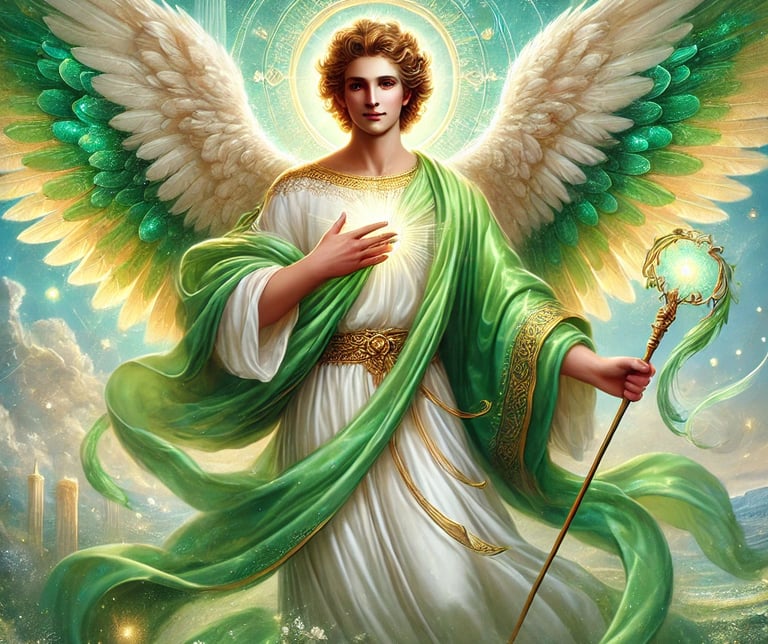The Angel Raphael:
A Theological Perspective
Introduction
The angel Raphael is one of the most revered celestial beings in Abrahamic faiths, particularly in Christianity and Judaism. His name in Hebrew (Rafa’el) means "God heals," emphasizing his divine role as a healer and guide. Though not as prominently featured in canonical scriptures as Michael and Gabriel, Raphael holds great theological significance as a messenger of God’s healing, protection, and divine guidance. This essay explores Raphael's religious importance, scriptural references, and how believers can invoke his assistance for spiritual growth and protection.
Raphael in Scripture (Christianity and Judaism)
Raphael in Judaism
Raphael appears in the Deuterocanonical Book of Tobit, which is recognized in the Catholic and Orthodox Christian traditions but not in the Hebrew Bible. In this text, Raphael is sent by God to aid Tobias (Tobit’s son) on his journey, guiding him safely and healing his father’s blindness. Raphael disguises himself as a human named Azarias and provides wisdom, protection, and healing throughout the story. His intervention not only leads to Tobit’s recovery but also delivers Sarah, Tobias’ future wife, from demonic oppression.
Although Raphael is not explicitly named in the Tanakh (Hebrew Bible), rabbinic literature and Kabbalistic traditions acknowledge him as one of the archangels. In Jewish mysticism, Raphael is often associated with divine healing and is invoked for protection against illness and misfortune. Some traditions identify him as one of the three angels who visited Abraham (Genesis 18), where he performed the role of healing Abraham after his circumcision.
Raphael in Christianity
Raphael’s role is most clearly defined in the Catholic and Orthodox traditions, where the Book of Tobit is accepted as part of the biblical canon. His assistance to Tobias symbolizes divine guidance and the power of faith in God's providence. The Catholic Church recognizes Raphael as one of the archangels, celebrating his feast day on September 29 along with Michael and Gabriel. In the Eastern Orthodox Church, he is honored on November 8 as one of the Synaxis of the Archangels.
Christian theologians regard Raphael as the angel of healing, both in a physical and spiritual sense. His presence in Tobit demonstrates God’s active concern for human well-being. Many Christians believe that Raphael continues to serve as a divine intercessor, helping those who seek healing, protection, and guidance in their faith journey.
Raphael in Other Religious Traditions
Though Raphael is primarily found in Jewish and Christian texts, some Islamic traditions acknowledge him as one of the great angels (Israfil in Arabic), often associated with the angel who will blow the trumpet to signal the Day of Judgment. Though the Quran does not mention Raphael by name, various Hadiths and Islamic scholars consider Israfil to have a role akin to Raphael’s function as a divine messenger.
Theological Significance of Raphael
Raphael embodies several key theological themes across the Abrahamic faiths:
The Angel of Healing – As his name suggests, Raphael represents divine healing. He restores sight to Tobit, demonstrating that God’s power can heal both physical and spiritual ailments.
Divine Guide and Protector – Raphael accompanies Tobias on his journey, safeguarding him against danger. His role as a guide reflects God's providential care for those who seek divine direction.
Mediator of Prayers – In the Book of Tobit, Raphael states that he presents prayers before God (Tobit 12:15). This establishes him as an intercessor who carries human petitions to the divine realm.
Defender Against Evil – Raphael aids Tobias in overcoming demonic oppression, signifying his power to protect believers from spiritual harm.
Invoking Raphael’s Guidance for Spiritual Growth and Protection
Believers across different traditions have sought Raphael’s presence in their lives, particularly in times of illness, uncertainty, and spiritual struggle. His role as a healer and protector makes him an ideal angel to call upon for divine assistance.
Prayer and Devotion to Raphael
In Christian tradition, prayers invoking Raphael often center on seeking healing and guidance. A common invocation is:
"Blessed Archangel Raphael, healer of God’s love, intercede for us that we may receive divine healing and wisdom on our journey of faith."
Catholics also pray the Chaplet of St. Raphael, a series of prayers dedicated to seeking his protection and intercession in matters of health, travel, and spiritual well-being.
In Jewish tradition, while direct prayers to angels are not common, believers may ask God to send Raphael for healing and protection. Traditional Hebrew prayers, such as the Mi Sheberach (a prayer for healing), often invoke God’s angels to assist in the healing process.
Seeking Raphael’s Help in Healing and Well-being
Raphael’s association with healing makes him an important figure for those suffering from illness or emotional distress. Believers may seek his intercession through prayer, meditation, or scripture readings. The story of Tobit serves as a source of encouragement for those in need of restoration, reminding them that divine aid is always near.
Some faithful also turn to blessed objects, such as medals and icons depicting Raphael, as a means of focusing their prayers for healing and protection.
Protection from Spiritual and Physical Harm
Raphael’s guidance of Tobias signifies his role as a protector against both physical and spiritual dangers. Travelers often invoke him for safe passage, much like Tobias did. Those who seek protection against negative influences, including temptations and demonic oppression, can call upon Raphael for divine shielding.
In contemporary times, many people also seek Raphael’s assistance in mental health struggles, recognizing his role in bringing peace and clarity to those burdened by anxiety and emotional suffering.
Conclusion: Raphael’s Ongoing Relevance in Faith
The angel Raphael remains a powerful and enduring figure across Judaism and Christianity. As the angel of healing, guidance, and divine intercession, his presence reassures believers of God’s love and care. His role in the Book of Tobit continues to inspire faith in divine providence, reminding people that God sends His messengers to heal, protect, and lead them.
In an age where physical, emotional, and spiritual healing is more needed than ever, Raphael's intercession offers hope and strength. By invoking his guidance through prayer and scripture, believers can draw closer to God’s divine plan and experience His healing touch. As a symbol of God’s boundless mercy and protection, Raphael’s influence endures, offering light to those in need and strengthening faith in the divine presence that watches over all who seek Him.


info@churchofwambo.org
© SDBEST LLC, 2025. All rights reserved.
